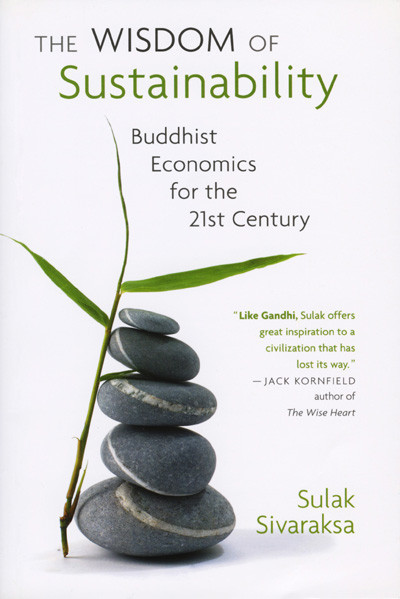As much as anyone I can think of, 76-year-old Sulak Sivaraksa embodies the qualities of an engaged Buddhist. He has been a practitioner, social philosopher, writer, publisher, teacher, activist, and troublemaking truth-teller for close to 50 years. While he is not well enough known in Western Buddhist circles, Sulak’s writings and work—he cofounded the International Network of Engaged Buddhists (INEB) and established many other grassroots organizations in Thailand and Asia at large—have formed an essential link between engaged Buddhists formore  than 30 years. Educated in England and Wales, Sulak is the author of at least 100 hard-to-find books in Thai and English, but this succinct new volume, The Wisdom of Sustainability, will broaden his audience and deepen our understanding of his critical vision for an interdependent world.
than 30 years. Educated in England and Wales, Sulak is the author of at least 100 hard-to-find books in Thai and English, but this succinct new volume, The Wisdom of Sustainability, will broaden his audience and deepen our understanding of his critical vision for an interdependent world.
I first met Sulak Sivaraksa 17 years ago, when he appeared on my doorstep in Berkeley, California—suitcase in hand—recently exiled from Siam. (He prefers the traditional name for Thailand.) His country was in the midst of one of its periodic military coups, and as a result of his brash inclination to speak truth to power, Sulak had been charged—not for the first or last time—with lèse-majesté (treason against a member of the ruling elite), in this case defamation of coup leader General Suchinda Kraprayoon. The seriousness of the charges, and threats against his life, had led Sulak to once again flee his native land. As the title of his autobiography—Loyalty Demands Dissent—suggests, all his life Sulak has been an inconvenient man.
When Sulak arrived at our home I was already familiar with his writings and inspired by his engaged Buddhist work. Earlier that year Parallax Press had released his book Seeds of Peace: A Buddhist Vision for Renewing Society. Many of us in the West inhaled his Buddhist-based vision of society and his teachings about the dangers of consumerism, the harsh realities of structural violence, and the necessity for grassroots interfaith social action. In the years since, a wide community of Buddhist activists have worked closely with Sulak in INEB and other initiatives, building relationships with peers in Burma, India, Sri Lanka, Ladakh, Bangladesh, Japan, Korea, Taiwan, and the West.
The Wisdom of Sustainability expands on the themes Sulak has hammered on for many years. He opens with a paragraph describing the Buddha’s first encounter with sickness, old age, death, and renunciation—the “heavenly messengers.” Just a paragraph later, he reports a conversation with James Wolfensohn, then president of the World Bank, at the time of the 1998 financial collapse in Asia. Sulak tells Wolfensohn that he sees the collapse as “a heavenly messenger to encourage us to seek alternatives to economic globalization.” While this seems to be a considerable leap, Sulak’s vision of dharma, as we come to see, is logically compelling and clear. He reframes the Four Noble Truths and the Eightfold Path as analytical tools for examining social and structural realities, and as guideposts toward a culture of peace. In the midst of conflict, the First Noble Truth, the acknowledgment of suffering, calls all parties to speak from their direct experience, he tells us. With the Second Noble Truth,
we try to understand the external and psychological roots of the conflict. When we project our emotions onto an object (animate or inanimate), we experience the “other” as having traits which, in fact, dwell first in our own unconscious mind…. To discover the roots of any conflict, we must also examine its psychological dimensions….
The Third Noble Truth is the cessation of the causes of suffering. This does not presuppose that we can reach a state that is conflict-free, but encourages us to grapple with the details—internal and external— every time. Conflict can be an opportunity to go directly to the heart of the matter and learn more about ourselves.
The Fourth Noble Truth—peace as a way of life—shows us how to live in ways that reduce suffering and conflict.
The Fourth Noble Truth is the Eightfold Path, which is precisely about relationship to the world around us and to ourselves. As Sulak says later in the book, “the teachings of the Buddha transcend individual salvation.” This emphasis on relationship, bringing everything down to a human scale is, in fact, the “wisdom of sustainability” to which the title refers. Extending the radical approach to Buddhist economics that E. F. Schumacher laid out in his influential 1973 book, Small Is Beautiful, Sulak writes:
We need to find ways to make communities stronger—socially, politically, and economically. We need to re-establish the commons—the public sphere. We need to engage community members to participate in making decisions about the things that affect their lives and livelihood.
Like all good teachers, Sulak raises essential questions, then leaves them for us to answer. But The Wisdom of Sustainability is deceptive in its simplicity: its message runs deep. As Sulak suggests, inner work goes hand in hand with social action; together they must be our life and practice.
The root of the word buddha means “to be awake.” When we are awakened to simplicity and humility and aware of the suffering engendered by greed, hatred, and ignorance, our consciousness is restructured. We become mindful about ourselves and others, and naturally try to restructure society.
My hope is that, inspired by this wise book, each of us can become more inconvenient—for the sake of the world.
Thank you for subscribing to Tricycle! As a nonprofit, we depend on readers like you to keep Buddhist teachings and practices widely available.